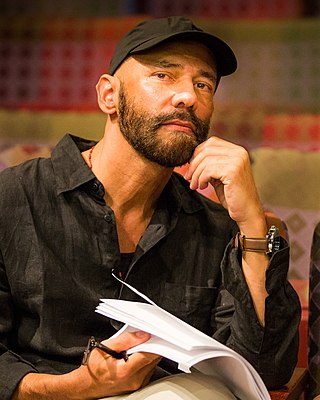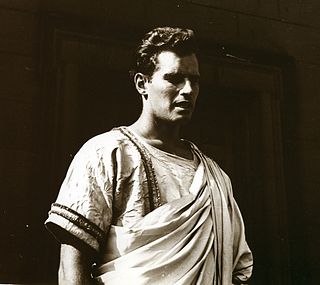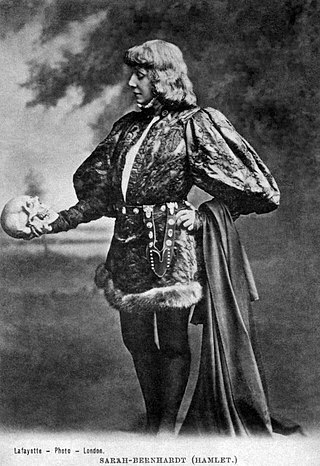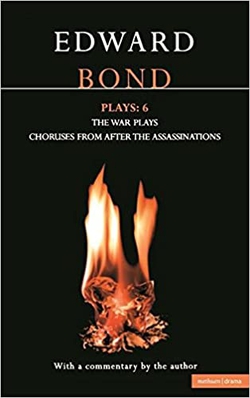
Edgar Montillion "Monty" Woolley was an American film and theater actor. At the age of 50, he achieved a measure of stardom for his role in the 1939 stage play The Man Who Came to Dinner and its 1942 film adaptation. His distinctive white beard was his trademark and he was affectionately known as "The Beard."

Behind the Green Door is a 1972 American pornographic film, widely considered one of the genre's "classic" pictures and one of the films that ushered in the Golden Age of Porn (1969–1984). Featuring Marilyn Chambers, who became a mainstream celebrity, it was one of the first hardcore films widely released in the United States and the feature-length directorial debut of the Mitchell brothers.

Epic theatre is a theatrical movement that arose in the early to mid-20th century from the theories and practice of a number of theatre practitioners who responded to the political climate of the time through the creation of new political dramas. Epic theatre is not meant to refer to the scale or the scope of the work, but rather to the form that it takes. Epic theatre emphasizes the audience's perspective and reaction to the piece through a variety of techniques that deliberately cause them to individually engage in a different way. The purpose of epic theatre is not to encourage an audience to suspend their disbelief, but rather to force them to see their world as it is.

Off-off-Broadway theaters are smaller New York City theaters than Broadway and off-Broadway theaters, and usually have fewer than 100 seats. The off-off-Broadway movement began in 1958 as part of a response to perceived commercialism of the professional theatre scene and as an experimental or avant-garde movement of drama and theatre. Over time, some off-off-Broadway productions have moved away from the movement's early experimental spirit.

Nilo Cruz is a Cuban-American playwright and pedagogue. With his award of the 2003 Pulitzer Prize for Drama for his play Anna in the Tropics, he became the second Latino so honored, after Nicholas Dante.
A political drama can describe a play, film or TV program that has a political component, whether reflecting the author's political opinion, or describing a politician or series of political events.

Julius Caesar is a 1950 film adaptation of the Shakespeare play Julius Caesar starring Charlton Heston. The first film version of the play with sound, it was produced and directed by David Bradley using actors from the Chicago area. Heston, who had known Bradley since his youth, and who was establishing himself in television and theater in New York City, portrayed Mark Antony. He was the only paid cast member. Bradley himself played Brutus, and Harold Tasker had the title role. Bradley recruited drama students from his alma mater Northwestern University for bit parts and extras, one of whom was future star Jeffrey Hunter, who studied alongside Heston at Northwestern.
A list song, also called a laundry list song or a catalog song, is a song based wholly or in part on a list. Unlike topical songs with a narrative and a cast of characters, list songs typically develop by working through a series of information, often comically, articulating their images additively, and sometimes use items of escalating absurdity.

Kenneth Thorpe Rowe was an influential professor of drama and playwriting. For decades, Rowe taught playwriting, Shakespeare and modern drama at the University of Michigan. There he had an enormous impact on students, from Arthur Miller to Lawrence Kasdan. His book Write That Play became a widely used college textbook for the teaching of playwriting.

Michael Earl Henderson was an American bass guitarist and vocalist. He was known for his work with Miles Davis in the early 1970s on early fusion albums such as Jack Johnson, Live-Evil, and Agharta, along with a series of his own R&B/soul hits and others featuring him on vocals, particularly the Norman Connors-produced hit "You Are My Starship" in 1976 and other songs in the mid to late-1970s.
Laila Robins is an American stage, film and television actress. She has appeared in films including Planes, Trains and Automobiles (1987), An Innocent Man (1989), Live Nude Girls (1995), True Crime (1999), She's Lost Control (2014), Eye in the Sky (2015), and A Call to Spy (2019). Her television credits include regular roles on Gabriel's Fire, Homeland, and Murder in the First, playing Pamela Milton in the final season of The Walking Dead (2022), and Colonel Grace Mallory in The Boys (2019–2024) and Gen V (2023).
"Speak the speech" is a famous speech from Shakespeare's Hamlet (1601). In it, Hamlet offers directions and advice to a group of actors whom he has enlisted to play for the court of Denmark.

Pravda is a satirical play by David Hare and Howard Brenton exploring the role of journalism in society. It was first produced at the National Theatre in London on 2 May 1985, directed by Hare and starring Anthony Hopkins in the role of Lambert Le Roux, white South African media mogul. Labelled a "Fleet Street comedy", it is a satire on the mid-1980s British newspaper industry during the Thatcher era, in particular the Australian press baron Rupert Murdoch. Its title refers to the Russian Communist party newspaper Pravda.
Marvin's Room is a play by the American writer Scott McPherson. It tells the story of Bessie and her estranged sister, Lee, who confront a family crisis.

Theatre or theater is a collaborative form of performing art that uses live performers, usually actors or actresses, to present experiences of a real or imagined event before a live audience in a specific place, often a stage. The performers may communicate this experience to the audience through combinations of gesture, speech, song, music, and dance. It is the oldest form of drama, though live theatre has now been joined by modern recorded forms. Elements of art, such as painted scenery and stagecraft such as lighting are used to enhance the physicality, presence and immediacy of the experience. Places, normally buildings, where performances regularly take place are also called "theatres", as derived from the Ancient Greek θέατρον, itself from θεάομαι.
Bloody Poetry is a 1984 play by Howard Brenton centring on the lives of Percy Shelley and his circle.
Howard S. Rubenstein was an American physician, playwright and translator of classical Greek drama.

Viet Rock is a rock musical by Megan Terry that served as inspiration to the musical Hair. A violent denunciation of the American involvement in the Vietnam War, the play was described by its author as a "folk war movie" comprising scenes of disillusionment and protest to the American military presence in Southeast Asia. Viet Rock is widely considered to be the first rock musical written and performed in the United States, as well as the first protest play about Vietnam. Its premiere also marks the first major theatre production in the United States in which actors left the stage to interact directly with the audience.
Nancy Diuguid was an American theater director, who lived and worked in England and South Africa.

The War Plays is the name often given to a trilogy of plays by English dramatist Edward Bond: Red Black and Ignorant, The Tin Can People, and Great Peace.












